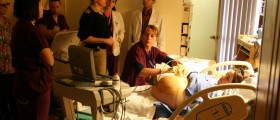
Prenatal Genetic Testing
Many of the common disorders are associated with the genes. Genetic testing was primarily developed to diagnose and prevent serious genetic disorders. Obstetric medicine performs the testing in pregnant women and their babies. The term prenatal testing refers to the tests for certain medical conditions in embryos or fetuses, before the childbirth.The main focus of these prenatal testing is to establish genetic problems, regardless theirs severity. Prenatal test can reveal the gender of a child, but doctors are also able to diagnose: Down syndrome, chromosome anomalies and neural tube defect. Some other health problems can be predicted with certainty, too, such as thalassemia, cystic fibrosis, spina bifida, cleft palate, or Tay-Sachs disease.
There are several different methods for prenatal screening. Some are not invasive at all while others are. Non-invasive techniques include tests for: pre-implantation genetic disorders, fetal cells in maternal blood, and also external examination, fetal heartbeat and ultrasound.
Other methods are more or less invasive, and doctors may perform: triple test, trophoblast cells, umbilical cord blood and chorionic villus sampling, detection of fetal blood cells in maternal blood, amniocentesis, embryoscopy and fetoscopy.
For Prenatal Testing
Probably the best reason to do prenatal genetic test is to discover the health condition of your baby.
Women tend to give birth of their first child in their 30s and 40s these days. These women have much greater risk of having a baby with some genetic problems. Down syndrome is particularly well studied. The studies revealed that if the mother of an unborn child is at the age of 20, the risk of chromosomal abnormality leading to this medical condition is 1 in every 500 born babies. For the women in her 30s the risk is 1 to 200, and for pregnant women in their 40s the risk goes up to 1 of 65.
Prenatal testing is the routine way (ultrasound) to discover the sex of your child.
Discovering the abnormality in the growth and development of your child might be another reason for the testing.
Against Genetic Testing
Advocates against prenatal test say that there might be some moral (and perhaps legal) consequences after the test results. Women or parents who find out that their child suffers from a genetic problem are faces with the hard decision – keep the baby or abort. Problem is less obvious when the condition is treatable, but more prominent once it isn’t.
Some couples having problems with infertility use the IVF technology. The reason for many debates, both private and public, is should these couples be able to choose the gender and certain physical qualities of their future kids. After that step, claim the advocates against genetic testing, children will be born without any physical faults and with pre-destined color of the eyes, height and weight.

















Your thoughts on this
Loading...